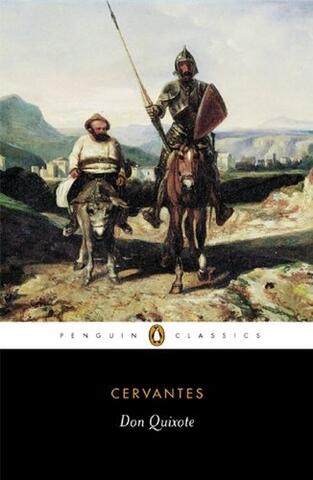
Don Quixote!
I have already read it 28 times, in English, French (once), and Spanish. Every time I read it, I dig a little bit deeper and discover a little bit more about the art of narrative and the craft of fiction.
I also find that the meaning changes for me as I age. As a school-boy, reading selected – and doctored – excerpts, I was asked to accept it as the English teacher taught it – hilariously funny. Those windmills – ha! ha! ha! Alas, I never saw the hilarity. Comedy – to laugh at and mock the folly of the impossible dream / tragedy – to understand the impulse that makes a person aim so high, and to see the tragedy of the fall and the failure.
For me, a specialist in seventeenth Spanish literature, it is a tragedy to see the old text reduced to a cartoon comic strip. It is even more tragic to read that the original text is much too difficult for the modern Spanish reader and that a new and simplified text has been issued. When I was last in Spain, many of my friends, although well-educated, had never read DQ – and no, that is not an acronym for Dairy Queen.
I guess it is the way of all things – the King James version of the Bible has now been replaced by several ‘modern’ and sometimes ‘swinging’ versions of the Biblical text. How much has the textual meaning changed as a result of these revisions? Shakespeare is being gradually phased out of the English literary canon in many modern schools on account of the difficulty of the language. Literature in general is in danger of being abandoned, as it is of little use according to the needs and whims of the modern curriculum. In my creative writing courses I am often told to use shorter sentences and only vocabulary at a Grade Nine reading level, or people will be unable to understand what I am writing.
Language in general has a tendency to simplify and reduce. However, how much creativity do we lose when acronyms and slogans take over the beauties of language and reduce it to its lowest common denominator? How much do we lose when we abandon the art of discourse analysis and take every short statement at its face value without exploring the possibilities behind its multiple meanings? What happens when we take language out of its context and use it in ways that the original text does not encourage?
Limbo dancing – how low can we go, will we go, and how much will we be lost, some of it forever?
Roger Moore is an award-winning academic (research, translation, and teaching) who also writes poetry and short stories with more than fifty books / chapbooks of poetry and short stories published. 200 of his poems and stories have appeared online and in 30 Canadian magazines and literary reviews.
Read Roger Moore's poetry in Issue 296 (Summer Poetry 2023)









